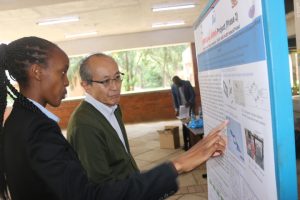
In a bid to foster research excellence and validate academic output, the AFRICA-ai-JAPAN Project hosted a poster presentation competition that brought together undergraduate and postgraduate students funded under the project, to showcase innovative research ideas across diverse thematic areas.
This year’s edition, conducted on May 28, 2025, featured 17 posters that addressed real-world challenges in health, agriculture, and engineering, affirming JKUAT’s role in generating locally relevant knowledge for national development.
Among the standout entries was Kevin Aduol’s research into dietary effects on diabetes. His study found that rats fed French fries prepared with unsaturated oils developed more visceral fat and progressed from pre-diabetes to diabetes faster than those fed boiled potatoes highlighting the significant impact of food preparation on health.
Nashiami Letonyia’s work on using cinnamon and papaya extracts to boost fish immunity, Bernardine Chirchir’s tomato seed treatment with biopesticides, and Peter Kiiru’s development of chicken feed enhanced with stinging nettle also proved promising in the agricultural sector.
Engineering innovations were equally impressive. Martin Ruthandi and Caleb Adisam introduced a smart welding system, while Zolani Ndlovu presented a precision wind tunnel calibrator. Patrick Wamalwa’s fuel-efficient portable bean thresher, capable of threshing two bags of beans using just one liter of petrol per hour, offered a timely solution to labor-intensive farming practices.
“The event was a good experience and an opportunity to interact with multiple faculties while disseminating our research,” said Mr. Adisam.
He expressed hope that future editions would involve the broader community for greater visibility and impact.
 Adisam is a Master’s student in Mechatronic Engineering at The Pan African University Institute for Basic Sciences, Technology and Innovation, based at JKUAT.
Adisam is a Master’s student in Mechatronic Engineering at The Pan African University Institute for Basic Sciences, Technology and Innovation, based at JKUAT.
Pramilla Mwibada, a Master’s student in Horticulture, noted that the platform offered a valuable opportunity to receive feedback from both peers and experts in other disciplines.
Prof. Hiroshi Koaze, Project Lead of AFRICA-ai-JAPAN, lauded the high quality of the presentations and reaffirmed the project’s commitment to supporting JKUAT’s research environment.
“This platform not only exposes students to scientific dialogue but also helps them hone their oral presentation skills,” he said.
 Prof. Daniel N. Sila, Principal of the College of Agriculture and Natural Resources, expressed his admiration for the students’ preparedness and enthusiasm. He thanked JICA for its continued support in fostering a strong research culture at the University.
Prof. Daniel N. Sila, Principal of the College of Agriculture and Natural Resources, expressed his admiration for the students’ preparedness and enthusiasm. He thanked JICA for its continued support in fostering a strong research culture at the University.
The judging panel was composed of experts from AFRICA-ai-JAPAN’s sub-taskforces, including the Innovation Centres for Bio-resources, Molecular Biology and Biotechnology, and Computing and Technological Solutions.
All 17 participants will receive certificates of participation, with the top three being recognized with tokens of appreciation in a ceremony graced by the Vice Chancellor.

